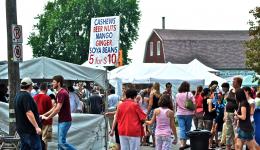Category:
Read I Corinthians 15: 1-11
We are privileged to share the Gospel, but what – and how much, are we to say?
My father, musing out loud really, one Sunday afternoon, a year or two before his death (and now he likely knows the answer), said: - I wonder how much you have to know and believe, before you can be a Christian. My father was a committed Christian, an elder in his church, faithful and believing, active and involved in the life of the local church that he and mother attended, a man with a life of integrity outside the church that was well-known and appreciated by family, friends and neighbours. I don’t know how many times I had heard him throughout my life talking about Jesus, sometimes even to ‘unbelieving’ neighbours, sharing with sincerity and sensitivity, but also with a boldness I don’t have even now, quoting on occasion the verse from John (in the King James Version, of course) where Jesus says: ‘He that has the Son hath life and shall not enter into condemnation, but has passed from death unto life.’
How much do we have to know, say - and expect people to respond to, before they can embrace and be embraced by God in ‘salvation’ and thereby hope to enter God’s Kingdom?. I Corinthians is St. Paul’s written summary of the Gospel, the essence of the Good News he knew himself called to proclaim: - This is what we preach, and this is what you believed.
There are of course other ‘summaries' in the New Testament, for instance like John 3:16: ‘For God so loved the world that He gave His only Son . . ." And there’s that place in Roman (10:9) where Paul writes: “If we confess with our mouth that Jesus is Lord and believe in our heart that God has raised him from the dead, we shall be saved."
Now what is the Good News? We have wondered together about what might be the first step of ‘good news’ for people that we meet. It would be good news for the refugee to find welcome and practical help: housing, clothing, a job. Usually, we do not start with the Good News until we have shown our ‘good-news’ love and concern in seeking to meet the immediate needs of people. But now, let’s try to focus on what now is that Gospel that we get to share with people who may at some point seek a reason for the hope within us; that is, when we get the privilege – and I think responsibility of putting the Gospel into words, summing up its essence, passing it on.
Kingdom versus Salvation? Some folk make a big deal about the difference of Jesus Message, while on earth, with, say, that of St. Paul. Jesus talks everywhere and always about the Kingdom of Heaven, or the Kingdom of God (which is the same thing.) We have noted how Jesus went into Galilee, proclaiming the good news of God. The time has come,” he said. “The kingdom of God has come near. Repent & believe the good news! But St. Paul talks more about the purpose of Jesus’ death and the saving merits of Jesus’ finished work in dyingfor sinners on the Cross, just outside the city walls of Jerusalem. But these two aspects: The Kingdom of God and all which that means - and our forgiveness of sins, and access to God through the salvation provided by Jesus death, are not be set against each other, for they are all of the same piece, the same cloth. It's about the same over-arching salvation: both are about the restoration and re-creation Plan of God. And Christians are called to witness to the Good News about Jesus, about His Salvation and about God’s Kingdom and New Creation Rule into which, even now, we can catch a glimpse – and one day enter.

Witnessing is not an impossible task, though it must be God-task. There are billions of people today and through history who already have not only been introduced to the Gospel but have also believed it, staked their lives on it - lived it or are living it now. Someone shared with them, as with us, the Gospel. A preacher, a pastor, a Sunday School teacher, a neighbour, some other ordinary person of faith told someone who told someone, and so on. Likely, several or many people introduced and brought them and us into fuller understanding. So, let’s not be overly-sensitive and hold back, or never get around to it. As we attempt to share as best we can, God will give us the courage and words we need, at the time.
Of course, we cannot say it all at any one time, because we do not know it all or what to say and because the ones with whom we wish to share it would not, I think, stand or sit there and wait for us to spell or fumble out the Message in its entirety. To dp so, as we’ve noted already, we would have to read to them the entire Bible! So, we witness as best we can as we simply ‘show up’ and prayerfully, lovingly, do and say what seems best at the time.
So, someone says to you or me: – “I'd like to become a Christian. How do I do that? What do you believe? How and what should I believe in order to become a follower of Jesus?” Now, I'm not going to tell you what to say. I don't know what you should say, but I encourage you to share as much of the facts of the matter as you can. (Honestly, I don't know what I'm going to say half the time but I believe God's Spirit creates open doors of opportunity for us to enter and share. I think He’ll give us the words to say – and when and how to say them.)
All I can do is give some examples, but I believe it’s essential that we try to stay close to central truths of the Gospel. The essence is recorded in this text but then we enter the actual and new situation and try to say it in our own words. There may be some conversation starters, or responses and we can prepare so as to be more ready. We can prepare as if we know the actual situation, even though we don't, as yet; we can think about it and prepare by studying the essence of the Gospel and thinking and articulating earlier what we might say when we actually get to the situation. But once there, the Holy Spirit may take and open up the whole conversation in quite different ways.
Evangelism is a kind of courting. My friend calls it "romancing the stone," for hearts may be very cold, shut, hostile or indifferent. A skilful lover seeks to woo – not seduce, the other.
Again we note that St. Paul has given us here the essence of the Gospel. Paul wrote his letters very early in Christian history, before his death under Nero the Roman Caesar in about 64 A.D So, we have here probably the earliest Christian writings, penned even before the four New Testament ‘Gospels’ were written, before the stories, facts and truths of the life and death and resurrection of Jesus were gathered together by the gospel writers. This is Paul's ‘take’ on the Gospel, the essence of what he was proclaiming and teaching everywhere. This is what all the apostles were preaching and this is what the Church in Corinth had come to believe, their Church being established upon this testimony.
It is a Gospel that saves, if we hold firmly to it a full-press commitment to its truth. This is what Paul would say. What is your Good News, verbalized? Let’s examine more closely what Paul taught and consider also some conversation starters we might use, as prompted by the situation and by the content of the Message.

1. We believe in Jesus – and In His Life and Death. Christ died for our sins . . . ‘Jesus’ – who is Jesus? We believe, as the Bible teaches, that He is God’s Son, the Jewish Messiah, the One Who came to show God’s love, through His own loving life and good works - and supremely by His death at Calvary, just outside Jerusalem’s walls.
Jesus talked much about the Kingdom of God, what it was like - saying it mostly in parables and metaphors that were sometimes so opaque to his hearers that He had to explain the meaning to His disciples. He talked too about hell, and about condemnation, and about God’s love in sending His Son that whoever believes in Him should not perish, but have everlasting life. He talked about being born anew (that is: born of the Spirit, born spiritually, being born ‘from above’). He said that if anyone has seen the Son we’ve also seen the Father, that is, that we’ve seen God! He said that all that the Father had given him (Jesus) would come to Him, and that whoever comes to Him, He’ll in no way cast out. He said that if he was lifted up, he’d draw everyone unto Him.
2. The death of Jesus. The Cross of Christ has been from earliest times the profound symbol of what Jesus came to do. He came to die. And cross(es) as symbol of how he died have been chiseled into and inscribed upon catacomb walls, in churches and homes for centuries, people making the sign of the cross in art and upon their own body. Somewhere in our sharing we must remember to talk about the death of Jesus: why He allowed it, why God planned it, why it happened – and what it means. He died on a cross, but why did he die? Well, then as now, not everyone believed what He said or who He said that He was. But more importantly, It was – says Paul - "for our sins…" - He died for our sins.
3. The world is broken. Someone says: - * "I don't know what this world’s coming to!…” upon hearing the most recent atrocity committed by ISIS or Al Qaeda, or of another kidnapping by extremists in northern Nigeria – upon reading of another knifing or shooting in some part of this city. Or someone says: * “My father-in-law had a heart attack.” Or - “My wife's sister has just been diagnosed with breast cancer.“ Or - “They lost the baby . . .” Or - “You know, the boss I used to work for has been arrested for fraud and insider trading.” And we pray, Lord, is this an opening?
The world and all, and each of us within it, are not alright. Things, we know deeply within, are not the way they should be. And we know too our own heart’s unbelief and rebellion, against what we know we should do – or not, which is ultimately rebellion and transgression against God and the way He wants us and the world to be.
But God has planned a way to show both mercy and forgiveness. He shows both justice and love in the Calvary work of Jesus who took upon Himself what we deserved. He died because the whole world was and is a mess – died to make it right, to rescue and put to right a world that was and continues to be so fouled up, so far removed from God’s Creation plans and purposes. And a holy God holds accountable people for their misdeeds and judges them accordingly. But Jesus died in our place, when it was we who deserved to die, were on our way to death already. Jesus died so we might not perish in and for our sins - but have Life - eternally, for otherwise we stand already under condemnation and He did not come to add to that, but so that the world through faith in Him should be set free and made whole again.
God, with so much love and mercy, sent Jesus to bring us back into His holy, loving Presence, back into relationship with God, with our own true selves – and others, back into our proper relationship with the creation, the planet we inhabit, back into His perfect creation purposes, under His Rule, His Kingdom once more.
* I can't find where love is. God loves; Jesus. Loves. Us. – enough to die for us
* My life is a mess. My marriage isn't working, my kids ignore me, I can't find friends who last.
* Why does God allow bad things? - Why do the good die young?
Yes, our world is broken, There is evil at work, in and around us, all throughout this planet. But I believe that God in Christ - through his finished work – has – and will gobble it up and destroy it!
4. The Scriptures foretold it. It’s said twice in the text (according to the Scriptures) in referring to the prophetic words concerning Jesus’ death and resurrection. Paul appeals to the authority of the Scriptures, for them the Jewish Old Testament even when many of his hearers would not be Jewish. It's important for us to know something of Old Testament truth (and, today, the New Testament, too!). The Jewish scriptures set the stage for all that Jesus would do and that He did accomplish - for example, the promise to Abraham: through you and your descendant, I will bless all the people . . . Paul argues in Galatians 4 that ultimately 'the seed' was Jesus!
There’s power and authority in God’s Word. God’s Spirit uses God’s Truth in Scripture to convict and convince. We should study it, live it, live into it – and then let it loose. Old Testament stories and truths and prophecies are like a "knock, knock" joke that set the scene. And then we ask – "Who's there?" And the answer is – God is: in Jesus! -Jesus! God in Christ, Jesus of Nazareth, come to earth for the healing and salvation of the world, the whole created order. Jesus has come for the healing of His People – and all the nations - and for the whole of creation; come to erase evil and remake all the sinew and stuff that makes up the universe. I trust the Bible when it says the world will be re-made and become a better, perfect place once more. I think we should work at it work with God now, co-operating in God’s Service, for God has worked it out and is working at it still. Ultimately, it will have to be God Who pulls it off.
5. The Resurrection of Jesus. Paul included Jesus’ resurrection as key, as central. Don’t leave it out; without it there’s no Gospel. We believe that Jesus rose again on the third day after his death, just as he had told his disciples he would. He was really dead – and He really was raised from the dead. The disciples were not hallucinating and it was not made up.
“Can you believe that there are some people with extremist faith who are willing to blow themselves up -even young people, because they think there's a marvelous reward waiting for them?” “I think they're misguided but I think Christians have hope in something that is more firm and true – that there is a Home of blessing that Jesus is preparing for us – and us for, after we die. Because Jesus rose in the dead, I too will rise from the dead. Even if I die physically I shall not die eternally but will continue into the eternal Life of the Ages. Why? - Because I’m trusting in Jesus – in His death – and also in His resurrection. What God did for Jesus, He promises to do for Jesus' followers – if we trust and obey Jesus.
It’s not about how good I am but about how good was / is Jesus. And in faith, I am forever linked with His goodness: His life, His death, His resurrection, and with the power and fruit of His Spirit living in me. He was 'firstborn' of the New Creation, a 'second Adam.' But I've been reborn too, a brother-friend-follower of this new Adam.
When God became man in Jesus, Jesus became the first of all of us who will be raised into the New Life of the New Creation. Christians are called already ‘new creatures in Christ Jesus,' Again, Jesus has already entered into the fullness of what the New World, the new creation will be. By faith, we who believe and who follow can 'see it afar.' Christians can even now be in touch with God, through access in Jesus' Name, and by the enabling of His Spirit - and thereby know something (though by no means all - yet, about that new Life. I think it's possible that even when people who trust Jesus experience physical death that we will see those who've gone before us again, that there will be a Grand Reunion in the Great Beyond.”

6. There Were Hundreds of Witnesses to the Resurrection – that Jesus, alive, appeared to them. Many are still alive, writes Paul - You can ask them. 'He really did rise from the dead,' you know, Paul is saying, 'and he appeared to Peter and then to the rest of the disciples – and even more, he appeared to hundreds – once to over five hundred men and women. He appeared to James . . . appeared to the other apostles.'
But Paul shares not only the historical facts of the matter, but also he gives his own experience. - I saw Him! We think he was speaking of his experience and vision on the Damascus Road, when he was awakened to the fact that it was Jesus – alive, well, speaking to Him. ‘Jesus appeared on this planet. – Jesus appeared to me!’ It’s why Paul could claim to be ‘an apostle,’ an eye-witness to the resurrection of Jesus. And thus was Paul given a life mission by Jesus: to reach the Gentiles with this Good News. He was an apostoles – a 'sent one.'
Jesus appeared to me: December 16th 1956, and often since (not bodily but spiritually). I became convicted and convinced and converted. Now, I’m no evangelist. I get to say what I believe when people come to Church, hiding behind a pulpit (smile). I get nervous, fear-full, tongue-tied when out and about and having a chance to share my faith. I'm a Canadian and we don't want to offend anyone. Sorry, sorry . . . I can be overly sensitive, with my own well-honed avoidance techniques. But over the years, sometimes God has given me the privilege of being a ‘spiritual mid-wife’ to assist in a new spiritual birth, with tears and much joy! We all get to start somewhere, sometime – does every true Christian, I think – evangelist or not.
I remember we had a time of testimony in one of our worship services, some years ago. We were in the midst of one of our Alpha programs, and it was a time too when we were beginning to take more seriously the possibility that people might be healed if we -- well, erm, actually prayed for them, with more intentionality, in the ‘now.’ One of our members told us how at work a friend had said that he was suffering from something or other. And our member told the Fellowship that rather than merely being sympathetic or in a general kind of way, saying, I’ll pray for you, he said: ‘If you like, I’ll pray for you NOW.' And they went into a quiet place at the office and he prayed for the other – and both were blessed in that, whether or not there was an immediate cure, help or blessing. The faith of one was strengthened; the faith of the other may well have been kick-started.
Our confession doesn’t need to be expansive, full and complete. We don’t have to say it all at one time. There may be more opportunities – or someone else may fill in the blanks. But we do get to say something in the ‘now’ of every situation – and it’s best if that’s linked with our personal faith in Jesus, our own testimony and conviction.
I believe in Jesus – In His near Presence. He’s Lord of this Church – and of our hearts. The historical Jesus (who died in Jerusalem in about 34AD) - is alive and well and living near you.‘ Jesus is alive!’ – even though He died and we can have immediate contact with Him, through prayer. As God speaks and as God is near there is always opportunity to repent and believe the Good News - to trust again, or maybe for the first time – to say ‘yes’ or ‘no’ to God’s gracious Gift to us in Christ, to begin anew or again an adventure and journey of discovery, of joy and peace that will never end.









